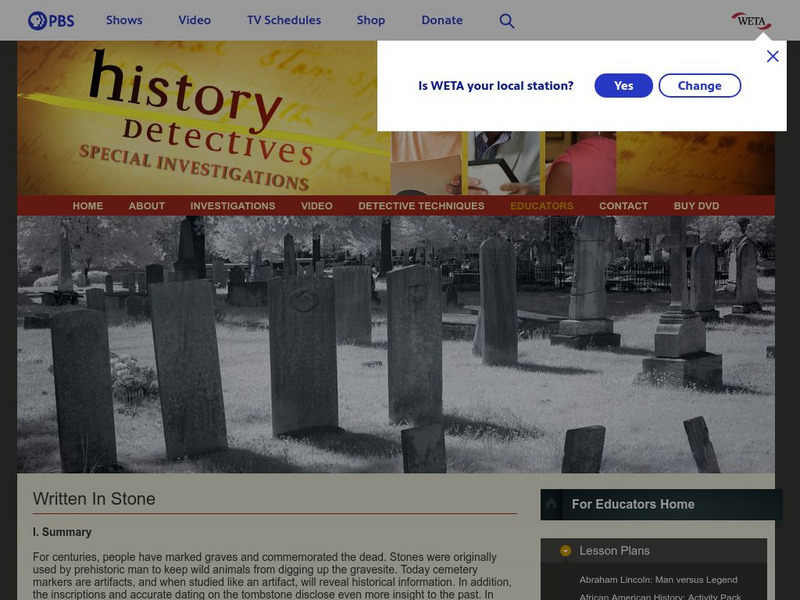Curated OER
What Can We Learn From Bones?
Students discuss what type of information they can gather from bones. In groups, they travel between stations in which they can view photos and listen to actual accounts of finding bones. They focus on the tools available to Native...
Curated OER
How to "Read" an Artifact
Students discuss the types of information they can get from artifacts. In groups, they practice "reading" artifacts and determining their usage. They use inferences to test against official information about certain pieces. They also...
Curated OER
Forward March: Continuing Frederick Douglass' Footsteps
Students view numerous artifacts from the life of Frederick Douglass. Using the objects, they discover the many parts of his life and develop a hypothesis about the significance of the objects in his life. They identify the...
Curated OER
The Ancient Cliff Dwellers of Mesa Verde
Students research evidence discovered during Mesa Verde archaeological dig, view images of ancient artifacts, simultate real dig and reconstruct items buried on school grounds, and create newsletter or video tape skit.
Curated OER
Ancient Egypt
This lesson plan template aligns with the TechnoMummy curriculum and resources, but includes great ideas to use without the curriculum. During this lesson on Ancient Egypt, students will become Egyptologists and learn about ancient...
Curated OER
The Vikings: Woodquay, Dublin
Middle schoolers view the progamme that leads them through the process of researching an historical site. They are given the deifinition of an archaeologist. Students watch as two ten year olds are given the task of finding out as much...
Curated OER
Scrapbook
Students read a book and use the internet to find images to accompany it. After choosing one of the artifacts, they complete a full analysis worksheet and write a journal entry about how the artifact was used. To end the lesson, they...
Curated OER
The Iceman 2
High schoolers identify and analyze the Iceman found in Europe with all of his organs preserved along with his personal artifacts. Students identify then about North Native Americans and write an essay defining their differences.
Curated OER
A Museum as Time Capsule
Students focus on museum artwork and artifacts as resources to study history and geography.
Curated OER
Digging Deep
Students investigate the job description for archeologists and share their findings with the class. They research a current archeological dig and present their material to the class.
Curated OER
Artifacts We Don't Dig Up
Students play a game of artifact show and tell using household items.
Curated OER
Ghana Artifacts
Students study to artifacts from Ghana and discuss how these aid in understanding the civilization.
Curated OER
LESSON PLANS (print version) pdf What is a Fossil?
Young scholars can better explain how mould and cast fossils occur when they make their own cast fossils using plaster of Paris and objects such as shells, bone or even their own hand or footprint.
Curated OER
Lost and Found
Students explore the historical and modern-day significance of archeological artifacts. They research other important archeological discoveries throughout history and write articles based on their research.
Curated OER
What's In The Bag?
Pupils research a historical figure from the United States and introduce their classmates to items associated with this person. They also predict how that historical figure would fit into today's society.
Colonial Williamsburg Foundation
The Colonial Williamsburg Foundation: Dirt Detective
Archaeologists study artifacts and soil and they use post holes to determine just how old the layers of soil is. Based on the location of post holes, archaeologists can determine if they are finding a house, or a wall or even a fort....
PBS
Pbs Learning Media: Writings of the Ancient Maya
Students are introduced to the ancient Mayan civilization through their writings. They explore a social studies focus on the destruction of many Mayan writings by the Spanish and what archaeologists have learned from the writings that...
Canada Science and Technology Museum
Canada Science and Technology Museum: Collection and Research
Canada has a long and rich history of innovation in science and technology. The artifacts collected, preserved, and displayed in the three museums of Ingenium showcase this history. Each artifact tells a fascinating story of innovation...
Khan Academy
Khan Academy: Activity: Social Status, Power, and Human Burials
This activity provides you with an opportunity to start thinking about the impact that farming can have on the way humans live and relate to each other. It will also allow you to think about the kinds of questions archaeologists and...
ABCya
Ab Cya: Journey to the Past Tense
Follow Rivette on her journey to the past and help her collect historical artifacts! In this game, kids will use their knowledge of past tense verbs to help fuel Rivette's time machine. Time-traveling users will have to recognize the...
American Museum of Natural History
American Museum of Natural History: Piecing Together the Puzzle of History
A brief introduction for students to the field of archaeology.
PBS
Pbs Teachers: Written in Stone
A lesson that takes students through the process of examining tombstones as artifacts, identifying information that can be instrumental in investigating a community's past or an individual's genealogy. Students also make gravestone...




















